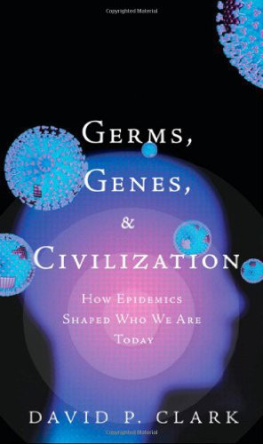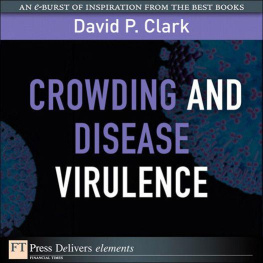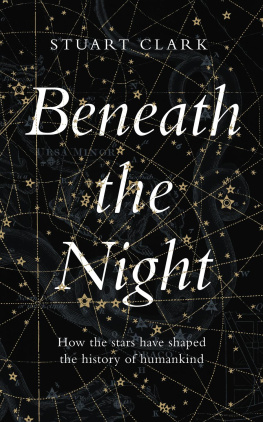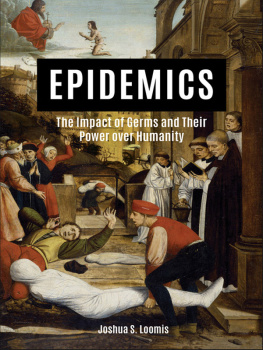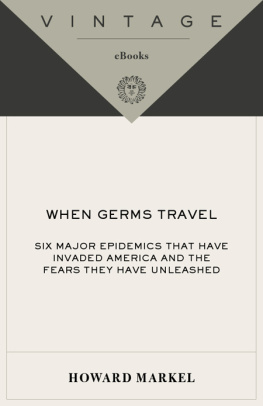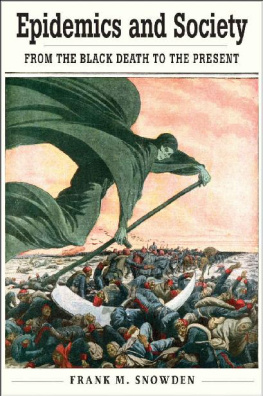
Germs, Genes, & Civilization
How Epidemics Shaped Who We Are Today
David P. Clark
Department of Microbiology,
Southern Illinois University
Vice President, Publisher: Tim Moore
Associate Publisher and Director of Marketing: Amy Neidlinger
Editorial Assistant: Myesha Graham
Development Editor: Kirk Jensen
Operations Manager: Gina Kanouse
Senior Marketing Manager: Julie Phifer
Publicity Manager: Laura Czaja
Assistant Marketing Manager: Megan Colvin
Cover Designer: Sandra Schroeder
Managing Editor: Kristy Hart
Senior Project Editor: Lori Lyons
Copy Editor: Krista Hansing Editorial Services
Proofreader: Kay Hoskin
Senior Indexer: Cheryl Lenser
Compositor: Nonie Ratcliff
Manufacturing Buyer: Dan Uhrig
2010 by Pearson Education, Inc.
Publishing as FT Press
Upper Saddle River, New Jersey 07458
FT Press offers excellent discounts on this book when ordered in quantity for bulk purchases or special sales. For more information, please contact U.S. Corporate and Government Sales, 1-800-382-3419, .
Company and product names mentioned herein are the trademarks or registered trademarks of their respective owners.
All rights reserved. No part of this book may be reproduced, in any form or by any means, without permission in writing from the publisher.
Printed in the United States of America
First Printing May 2010
ISBN-10: 0-13-701996-3
ISBN-13: 978-0-13-701996-0
Pearson Education LTD.
Pearson Education Australia PTY, Limited.
Pearson Education Singapore, Pte. Ltd.
Pearson Education North Asia, Ltd.
Pearson Education Canada, Ltd.
Pearson Educacin de Mexico, S.A. de C.V.
Pearson EducationJapan
Pearson Education Malaysia, Pte. Ltd.
Library of Congress Cataloging-in-Publication Data
This book is dedicated to my younger brother, Andrew, who has always enjoyed a good argument.
Contents
Preface
Humans typically labor under the illusion that they control their own destiny. This book argues that, in reality, invisible microbes often control human activities. Recent findings have shown that animals that develop without their natural bacterial inhabitants have defective immune systems and poor health. Thus, we and other animals depend on the bacteria for our healthy development. On a larger scale, we now recognize that microbes maintain the global ecosystem and are partly responsible for keeping our planet healthy. The amount of good bacteria that work to recycle nutrients and degrade waste is greater by far than the amount of bad bacteria that threaten human health.
Here I enter the intermediate zone between individual development and planetary ecology, to discuss how microbes have decided major historical events and shaped cultural trends. Furthermore, the emergence of resistance to infectious diseases has selected alterations in genes that affect human behavior.
This book is not a history of public health, medicine, or microbiology, although it does mention these issues. Instead, this book describes how infections have shaped both individual humans and their societies from the very beginning of civilization. Disease has influenced our cultural and religious beliefs, as well as determined the outcome of wars and major historical events. I have tried to show how beneficial long-term effects have resulted from epidemics that were terrible tragedies to those caught up in them.
Philosophically, we are just emerging from a period of transition between the perfectionist and selfish views of nature. The classic example, in the area of disease, is the idea that, over the ages, infectious agents will adapt to their hosts. Eventually, all diseases will become no worse than a bad cold. This is an attempt to retain a utopian future while allowing evolution to occur. Recently, we have come to realize that although some diseases become milder, others might evolve with greater virulence. We now see nature more as an arms race between life forms deploying assorted genetic strategies.
A second aspect of this more modern viewpoint, is to realize that the scale on which we view events is important. Improving a species through evolution inevitably involves the death of many less fit individuals. Applying this Darwinian idea to human populations lets us see that whereas mass fatalities from a plague are tragedies at the personal level, they can have positive effects when seen from a long-term perspective.
These positive effects vary from genetic changes that make us more resistant to the disease responsible for the epidemic (and often to related infections), to effects on human society that are hard to pin down and quantify. Epidemics have undoubtedly affected the outcome of many wars and conflicts. Whether these interventions were a good thing obviously depends on which side you support. Less ambiguous is the contribution of epidemics to the development of a free, technologically based society in the West. More ambiguous are the possible effects on religious belief and human behavior.
Modern progress in DNA technology and human genetics is generating a vast amount of data. Analyzing and checking this will take time. The next few years should reveal many connections between infection, disease resistance, and alterations in genes that affect not only our physical characteristics, but also brain function or development and thus impact human behavior. We live in exciting times!
David Clark
Carbondale, Illinois
Acknowledgments
I would like to thank Donna Mueller for commenting on some early drafts, and Kirk Jensen for long-term editorial support through several versions of the manuscript.
About the Author
David Clark was born June 1952 in Croydon, a London suburb. After winning a scholarship to Christs College, Cambridge, he received his Bachelor of Arts degree in 1973. In 1977, he earned his Ph.D. from Bristol University for work on antibiotic resistance. David then left England for postdoctoral research at Yale and then the University of Illinois. He joined the faculty of Southern Illinois University in 1981 and is now a professor in the Microbiology Department. In 1991, he visited Sheffield University, England, as a Royal Society Guest Research Fellow. The U.S. Department of Energy funded Davids research into the genetics and regulation of bacterial fermentation from 1982 till 2007. David has published more than 70 articles in scientific journals and graduated more than 20 masters and Ph.D. students. He is unmarried and lives with two cats: Little George, who is orange, and Ralph, who is mostly black and eats cardboard. David is the author of Molecular Biology Made Simple and Fun, now in its third edition, as well as three more serious textbooks.
1. Introduction: our debt to disease
Early in the fifth century A.D., the Huns, led by Attila, emerged from the Asian steppes and swept across Europe. They faced no serious resistance. What was left of the greatest civilization the world had seen, the Roman Empire, was a tottering wreck. One more good shove and the remains of Roman civilization would have taken a final nose-dive. But strangely, on the verge of storming Rome itself, Attila withdrew. Why?
For many centuries the official answer was that God had intervened in some mysterious way to protect his chosen city, Rome, seat of the papacy. In more recent times, such supernatural explanations have fallen out of favor and the question has arisen anew. Some have suggested that Attila was overawed by the sanctity of Rome. But why would a pagan warlord like Attila stand in awe of a Christian center? Attila was by no means an ignorant barbarian: For example, he invited Roman and Greek engineers into Hun territory to install bathing facilities. However, his respect for Roman civilization was clearly of a pragmatic rather than a religious nature. Another theory is that Attila was worried about leaving unattended his newly acquired homeland, in what is now Hungary. But then why did he venture out almost as far as Rome and hang around indecisively for so long before returning? All these explanations founder on the same point. It seems clear that Attila did indeed set out with every intention of taking Rome, but his expedition came to a premature halt.
Next page
